A Senior Design team won top prize at the Air Force Research Lab University Design Challenge with its design for a wearable cooling device for soldiers in the field.
[ read more]
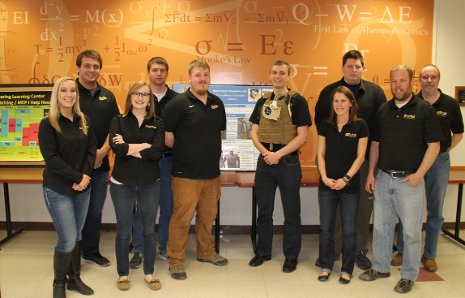
A Senior Design team won top prize at the Air Force Research Lab University Design Challenge with its design for a wearable cooling device for soldiers in the field.
[ read more]

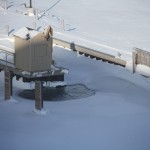 There are two ways to measure sounds: actively and passively. “Passive acoustics is just listening to whatever is out there,” says Andrew Barnard, an assistant professor in mechanical engineering studying acoustics at Michigan Tech. He helped install a passive hydrophone system off the dock at the Great Lakes Research Center (GLRC), which is a unique set-up under the ice.
There are two ways to measure sounds: actively and passively. “Passive acoustics is just listening to whatever is out there,” says Andrew Barnard, an assistant professor in mechanical engineering studying acoustics at Michigan Tech. He helped install a passive hydrophone system off the dock at the Great Lakes Research Center (GLRC), which is a unique set-up under the ice.
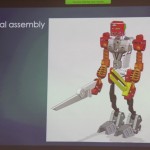 The Michigan Tech Mechanical Engineering version of the Partners for the Advancement of Collaborative Engineering Education PACE Engineering Design Competition was held on April 23, 2015.
The Michigan Tech Mechanical Engineering version of the Partners for the Advancement of Collaborative Engineering Education PACE Engineering Design Competition was held on April 23, 2015.
Photo Gallery is on 2015 ME-EM PACE Contest at Flickr
Project Description: The design project is mainly involving CAD modeling of a real world example but designed by the students specially for the competition. The students apply the skill they learned on Modeling, Assemblies, and drafting. Some of them may include analysis and animations. The students are required to select a project on their own and it should be original. They as a team will create the parts and assemblies and present at the competition. CAD modeling/assembly with analysis, of any equipment used in the project.
Judges for April 2015 PACE were KVC Rao, Michigan Tech ME-EM; John Baker, Siemens; Radheshyam Tewari, Michigan Tech ME-EM; Christopher Morgan, General Motors; Laura McCausland, General Motors; Andrew Rohr, General Motors; Chris Eaton, General Motors.
Judging Criteria
Form — Design Concept, Creativity, Perceived Value, Safety
Fit — Physical Model (realism, aesthetics, detail, supporting design)
Function — Design Parameters and Performance (math models, simulations, spreadsheets, etc.)
Presentation — Effective, Professional, Credible
Teamwork and Collaboration
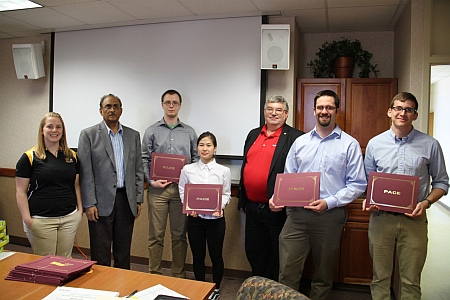
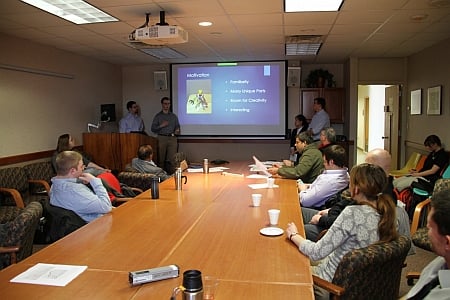
See all the rest of the photos at Photo Gallery is on 2015 ME-EM PACE Contest at Flickr
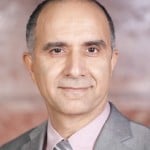 The ME-EM Graduate Seminar speaker on Thursday, April 23 at 4:00 in 103 EERC will be Dr. Reza Tafreshi from Texas A&M University at Qatar.
The ME-EM Graduate Seminar speaker on Thursday, April 23 at 4:00 in 103 EERC will be Dr. Reza Tafreshi from Texas A&M University at Qatar.
The title of his presentation will be ‘Development of a Low Dimensional Two-Phase Thermal Model for Subsea Pipelines’.
Rising global energy demand has led to new operational challenges in unfamiliar environments, with higher temperature gradients. The challenges directly address safety, environmental and economic issues. Due to the low subsea temperatures and relatively higher petroleum fluid temperature in deep water pipelines, convectional heat losses occur from the petroleum fluids to the surroundings. This heat transfer is necessary to be considered, to ensure the proper flow of petroleum fluids. While conventional equivalent heat transfer models are easier to compute, they are not accurate enough to reflect the changes that would occur within a fluid due to different multiphase flow regimes and proportions. The objective is to develop a low dimensional and low computational equivalent thermal model of subsea fluids, which can predict two-phase fluid temperatures along insulated subsea pipelines. The developed heat transfer model combines the application of two-phase heat transfer coefficient model with fluid properties obtained from a low dimensional fluid model developed by our group. The presented model identifies the effect of heat transfer in subsea pipelines for two-phase fluids for normal operating and shut-down conditions. This model, when compared with industry standard software, showed that results were obtained with similar accuracy with approximately 1000 times less computational time.
Some other current research activities will be also discussed.
Reza Tafreshi received his B.Sc. and M.Sc. degrees from the K.N. Toosi University of Technology, Tehran, Iran, in 1991 and 1995, respectively, and his Ph.D. degree in mechanical engineering from the University of British Columbia (UBC), Vancouver, BC, Canada, in 2005. He was a site engineer and then a project manager at PoloDej Company, Tehran, from 1995 to 1999. From 1999 to 2000, he was a Research Engineer with the Department of Mechanical Engineering, UBC. Dr. Tafreshi was a recipient of the Michael Smith Foundation for Health Research Award, Canada, and was a postdoctoral fellow at the Department of Electrical and Computer Engineering, UBC, from 2005 to 2006. He was a Visiting Assistant Professor with Texas A&M University, College Station, TX, in 2006. In 2007, he joined Texas A&M University at Qatar, Doha, Qatar, where he is currently an Assistant Professor. His research fields include dynamic systems and controls, machine fault diagnosis, condition monitoring, and biomedical engineering.
The ME-EM Senior Recognition Banquet and Order of the Engineer Program was held on Tuesday, April 14, at 6 p.m. in Rozsa Center Lobby.
The keynote speaker was Jeff Zawisza, Fellow at Dow Chemical and a 1983 ME-EM alumnus.
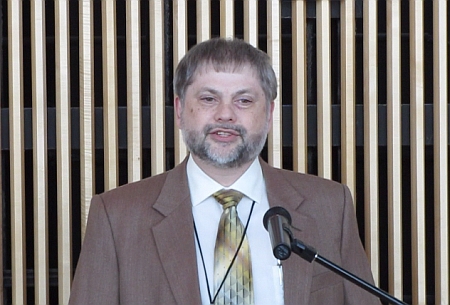
ME-EM Outstanding Enterprise Student Award: William Gielda, Clean Snowmobile Enterprise team
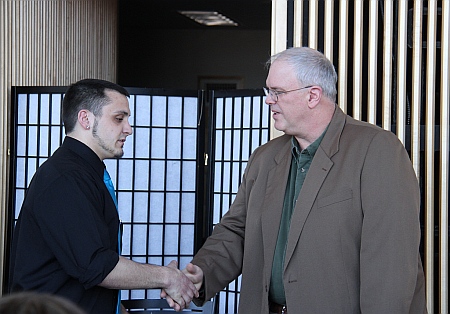
ME-EM Teacher of the Year: Charles Van Karsen
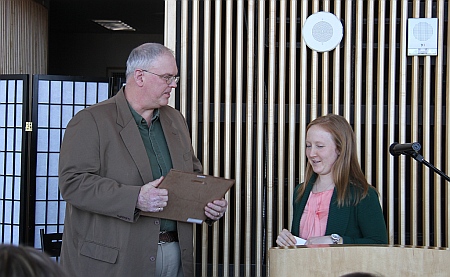
According to the Order of the Engineer manual: The Order of the Engineer is a solemn obligation to oneself to uphold devotion to the standards and the dignity of the engineering profession. It is an obligation to turn to practical use the principles of science and the means of technology…to serve humanity by making the best use of earth’s precious wealth.
The Obligation is a creed similar to the oath attributed to Hippocrates (460-377 B.C.) that is generally taken by medical graduates and which sets forth an ethical code. The Obligation likewise, contains parts of the Canon of Ethics of major engineering societies. Initiates, as they accept it voluntarily, pledge to uphold the standards and dignity of the engineering profession and to serve humanity by making the best use of Earth’s precious wealth.
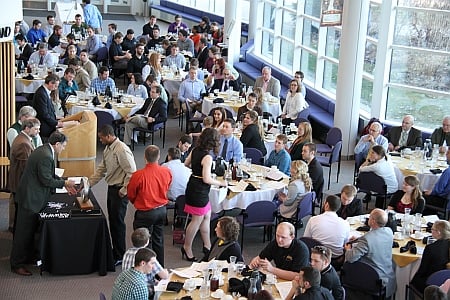
Photos of the ME-EM Senior Recognition Banquet included in the ME-EM Photo Gallery
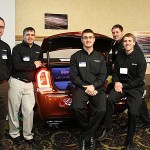 The mechanical engineering-engineering mechanics department held its semi-annual Senior Capstone Design Day Program on Tuesday April 21, 2015. Eighteen teams presented the fruits of their efforts over the past two semesters during presentations to industry reps, faculty, staff, students and MEEM External Advisory Board members. The teams displayed posters and, in some cases, their prototypes in the rear first-floor hallway of the MEEM building. This year’s project customers include American Axle & Manufacturing, Chrysler, John Deere, MacLean-Fogg, and others. Most presentations are open to the public.
The mechanical engineering-engineering mechanics department held its semi-annual Senior Capstone Design Day Program on Tuesday April 21, 2015. Eighteen teams presented the fruits of their efforts over the past two semesters during presentations to industry reps, faculty, staff, students and MEEM External Advisory Board members. The teams displayed posters and, in some cases, their prototypes in the rear first-floor hallway of the MEEM building. This year’s project customers include American Axle & Manufacturing, Chrysler, John Deere, MacLean-Fogg, and others. Most presentations are open to the public.
Spring 2015 4911 final presentations
Michigan Tech Design Expo 2015
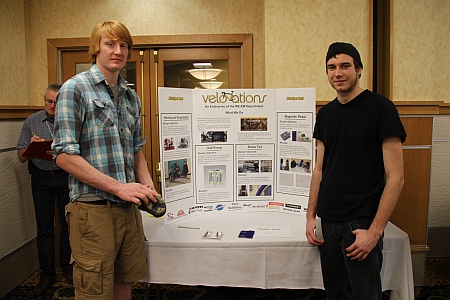
3rd Place Award – Velovations
Team Leaders: Ian Connick, Mechanical Engineering and Kyle McGurk, Electrical Engineering
Advisor: Steve Lehmann and Paulus Van Susante, Mechanical Engineering-Engineering Mechanics
Sponsors: Specialized, Thomson, Department of Kinesiology and Integrative Physiology
Project Overview: Our team is dedicated to working on bicycle and bicycling industry related projects. For the 2014-2015 academic year, Velovations has more than twenty-five students from various majors divided into four projects. The projects are: a pedal that offers the ability to transition from clipped in to a platform and back at the push of a button; a system to allow tire pressure change on the fly;
an inexpensive winter commuting tire; and an innovative exercise system for wheelchair users that will allow further physical research. Velovations projects cover the complete product development
range, from idea conception, research, and development, to customer communication, testing, and ultimately manufacturing.
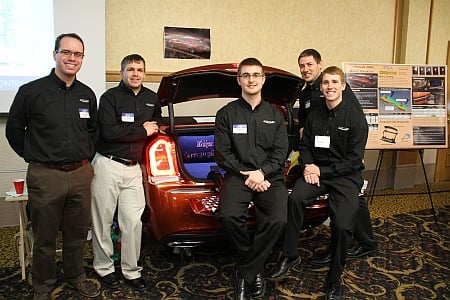
Honorable Mention – Chrysler 300 Split Tailgate
Team Members: Kelly Shanahan, Joshua Yagley, Alex Bancroft, Jerad Marble, and Parry Ragland, Mechanical
Engineering
Advisor: Kevin Johnson, Mechanical Engineering-Engineering Mechanics
Sponsor: Fiat Chrysler Automobiles
Project Overview: Our goal is to design, engineer, build, and test a split decklid adapted from the current Chrysler 300 architecture. This decklid system will provide the customer both the access required of typical decklids without the upswing of the lower waterfall area and the added feature of a tailgate style lower swing out panel which will provide a surface for tailgate functions. This feature is rare in the industry and provides an opportunity for segment differentiation creating a unique selling point.
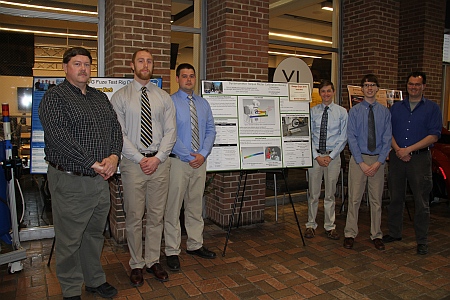
Honorable Mention – Dynamometer Calibration Device
Team Members: Kristopher Benaglio, Christopher DeGroot, Adam Deibler, Kenneth Smith, Mechanical Engineering
Advisor: Paul van Susante, Mechanical Engineering-Engineering Mechanics
Sponsor: John Deere
Project Overview: This design team is working with John Deere to develop a new dynamometer torque meter calibration device. A dynamometer, commonly referred to as a dyno, is a popular test instrument used to measure variables such as torque, speed, and power output. The current calibration method used by John Deere utilizes a static weight stack attached to a moment arm. This design must be replaced because it exceeds the dynamometer test cell envelope, is difficult to transport from test cell to test cell, requires considerable time and effort for two workers to assemble and disassemble, and requires the repetitive lifting of 40 to 45 pound weights.
See a complete recap summary of the 2015 Michigan Tech Design Expo
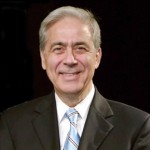 The ME-EM Graduate Seminar speaker on Thursday, April 16 at 4:00 in 103 EERC will be Dr. Emmanuel Gdoutos, Professor at Democritus University of Thrace, Greece, Adjunct Professor at Northwestern University. The title of his presentation will be ‘Multiscale Mechanical And Fracture Characterization Of Cementitious Nanocomposites.”
The ME-EM Graduate Seminar speaker on Thursday, April 16 at 4:00 in 103 EERC will be Dr. Emmanuel Gdoutos, Professor at Democritus University of Thrace, Greece, Adjunct Professor at Northwestern University. The title of his presentation will be ‘Multiscale Mechanical And Fracture Characterization Of Cementitious Nanocomposites.”
Results are presented for the mechanical and fracture properties of cementitous materials reinforced with multiwall carbon nanotubes (MWCNTs) and carbon nanofibers (CNFs). The MWCNTs and CNFs were dispersed in water by applying ultrasonic energy and using a surfactant. Three-point bending tests were performed to obtain the mechanical and fracture properties. The nanomechanical stiffness of the nanocomposites was investigated by nanoindentation tests. It was found that the modulus of elasticity and flexural strength increase substantially for a reinforcement of 0.08 wt.%. Fracture mechanics characterization of these materials was also performed. The excellent reinforcing capabilities of MWCNTs and CNFs are demonstrated by a significant improvement in critical stress intensity factor and critical strain energy release rate resulting in advanced materials for civil engineering applications.
Dr. Emmanuel E. Gdoutos is Professor at the Democritus University of Thrace, Greece and Adjunct Professor at Northwestern University. He is member of European and national academies worldwide, Fellow of technical societies and received medals and awards from technical societies. Recently, a special issue of the journal Meccanica was published in his honor. He received an honorary Ph.D. from the Russian Academy of Sciences and the University of Nis, Serbia. He is author of over 300 technical papers and 17 books and editor of 18 books. He served as Editor-in-chief of Strain (2007-2010), President of the European Structural Integrity Society (ESIS) (2006-2010), chairman of the European Association for Experimental Mechanics (EURASEM) (2003-2007), President of the Society for Experimental Mechanics (SEM) (2013-2014).
 The ME-EM Graduate Seminar speaker on Thursday, April 9 at 4:00 in 103 EERC will be Dr. Margot Hutchins from Sandia National Laboratory.
The ME-EM Graduate Seminar speaker on Thursday, April 9 at 4:00 in 103 EERC will be Dr. Margot Hutchins from Sandia National Laboratory.
The title of her presentation will be ‘Building the Basis for Cybersecurity and Cyber Resilience in Critical Infrastructure’.
Increasing connectivity, use of digital computation, and off-site data storage provide potential for dramatic improvements in the effectiveness of many systems (e.g., energy, manufacturing, financial services, transportation). However, there are also risks associated with this increased connectivity as well as the volume and pervasiveness of data that are generated. The inherent trust among components of digital information and communications infrastructure provides ample opportunity for those with ill intent to do harm. Organizations have experienced cyber attacks that exfiltrate confidential and/or proprietary data, alter information to cause an unexpected or unwanted effect, and destroy capital assets. Given this complex and dynamic landscape, mitigating risk is an important strategy, but it may be necessary to ensure that critical infrastructure is resilient, that is, able to efficiently reduce both the magnitude and duration of the deviation for targeted system performance levels. Metrics and tools are needed to incorporate these considerations into existing risk management processes and to evaluate possible mitigation measures. This seminar will focus on two efforts to identify cybersecurity issues and the characteristics of cyber resilience. We will examine a framework that considers the data flows within a manufacturing enterprise and throughout its supply chain, which provides several mechanisms for identifying generic and manufacturing-specific cyber vulnerabilities. We will also consider how several existing modeling and simulation capabilities could be integrated to address resilience in the electric grid.
Dr. Margot J. Hutchins is a Senior Member of Technical Staff at Sandia National Laboratories. She currently conducts systems analysis in support of U.S. national security objectives, including cyber resilience of critical infrastructure and international engagement on the implementation of nuclear detection architectures. She received her Ph.D. from the Department of Mechanical Engineering-Engineering Mechanics at Michigan Technological University, where she focused on supporting the inclusion of the social dimension of sustainability in business, manufacturing, and design decision making by developing relevant indicators and techniques. She was a postdoctoral scholar and later a research engineer in the Laboratory for Manufacturing and Sustainability at the University of California, Berkeley. There, Dr. Hutchins had the opportunity to work with industrial, regulatory, and other stakeholders on a variety of projects, including establishment of a benchmarking methodology to support California’s cap-and-trade program and development of key sustainability performance indicators for a large retailer’s suppliers.
Sandia National Laboratories is a multi-program laboratory managed and operated by Sandia Corporation, a wholly owned subsidiary of Lockheed Martin Corporation, for the U.S. Department of Energy’s National Nuclear Security Administration under contract DE-AC04-94AL85000
Dr. Margot J. Hutchins is a Senior Member of Technical Staff at Sandia National Laboratories. She currently conducts systems analysis in support of U.S. national security objectives, including cyber resilience of critical infrastructure and international engagement on the implementation of nuclear detection architectures. She received her Ph.D. from the Department of Mechanical Engineering-Engineering Mechanics at Michigan Technological University, where she focused on supporting the inclusion of the social dimension of sustainability in business, manufacturing, and design decision making by developing relevant indicators and techniques. She was a postdoctoral scholar and later a research engineer in the Laboratory for Manufacturing and Sustainability at the University of California, Berkeley. There, Dr. Hutchins had the opportunity to work with industrial, regulatory, and other stakeholders on a variety of projects, including establishment of a benchmarking methodology to support California’s cap-and-trade program and development of key sustainability performance indicators for a large retailer’s suppliers.
Sandia National Laboratories is a multi-program laboratory managed and operated by Sandia Corporation, a wholly owned subsidiary of Lockheed Martin Corporation, for the U.S. Department of Energy’s National Nuclear Security Administration under contract DE-AC04-94AL85000.
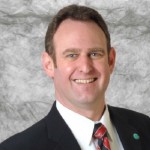 The ME-EM Graduate Seminar speaker on Thursday, April 2 at 4:00 in 103 EERC will be Dr. Robert Keynton from Chair, Professor & Lutz Endowed Chair, Dept. of Bioengineering (W.H. Coulter Foundation Partner)Engineering Innovations Program Manager, Office of the Assoc. VP Research & Innovation Fellow, American Institute of Medical & Biological Engineering
The ME-EM Graduate Seminar speaker on Thursday, April 2 at 4:00 in 103 EERC will be Dr. Robert Keynton from Chair, Professor & Lutz Endowed Chair, Dept. of Bioengineering (W.H. Coulter Foundation Partner)Engineering Innovations Program Manager, Office of the Assoc. VP Research & Innovation Fellow, American Institute of Medical & Biological Engineering
University of Louisville, Louisville, KY.
The title of his presentation will be ‘Micro/Nanotechnologies for Field Deployable Environmental Sensing & Biomedical Applications’.
Micro/nanofabrication techniques have become a crucial tool for creating high resolution and/or high sensitivity devices for a wide variety of applications including biomedical, environmental, and space exploration. For example, inexpensive microfabricated sensors combined with low power instrumentation offer unique advantages for remote, electrochemically-based environmental sensing Our group has been actively engaged in the development of coulometric stripping techniques for calibration-free detection of heavy metals with limits of detection on the order of picomoles. Additionally, our group has developed a direct-write process to fabricate micro/nanoscale polymeric fibers to create microfluidic and tissue scaffold structures. Another area of research includes the development of a custom-designed, flexible, thin-film microelectrode array directly interfaced to a multichannel signal conditioning microchip to enable high-quality recordings of the electrical activities of the heart with high spatial resolution, on the order of individual myocytes, to attain valuable information required for studying the mechanisms of cardiac arrhythmias. These projects and others will be presented in this seminar.
Robert S. Keynton is currently the chair, professor and the Lutz Endowed Chair of Biomechanical Devices of the Department of Bioengineering at the University of Louisville (UofL). He received the B.S. degree in engineering science and mechanics from Virginia Tech, Blacksburg, VA, in 1987, the M.S. and Ph.D. degrees in biomedical engineering from the University of Akron, Akron, OH, in 1990 and 1995, respectively. In 1995, he joined the Biomedical Engineering program at Louisiana Tech University (LTU) as an Assistant Professor and became the Associate Director of Engineering for the Center of Applied Physics Studies in 1997 at LTU.
Since joining UofL in 1999 as an Assistant Professor in the Department of Mechanical Engineering, Dr. Keynton has served as the Sr. Associate Director of the UofL Micro/NanoTechnology Center and the interim Scientific Director of the Cardiovascular Innovation Institute. He was named the founding chair of the new Department of Bioengineering in 2005 and promoted to full professor and named a University Scholar in 2006. He co-founded two companies, Assenti, LLC and Ultra Trace Dectection, LLC with colleagues at UofL. He was named a Fellow of the American Institute for Medical and Biological Engineering (AIMBE) in 2007, elected to the AIMBE Board of Directors in 2012, recognized by the Houston Society of Engineering in Medicine and Biology as the 2001 Outstanding Young Scientist of the Year, has 101 peer-reviewed publications (both journal and conference), 128 conference papers, 5 book chapters, 6 patents issued, 11 provisional/non-provisional patents and 10 research disclosures. He has been involved in multidisciplinary research that includes funding from NIH, NSF, DHS, DOE, DoD, NASA, VA, Coulter Foundation & Helmsley Trust.